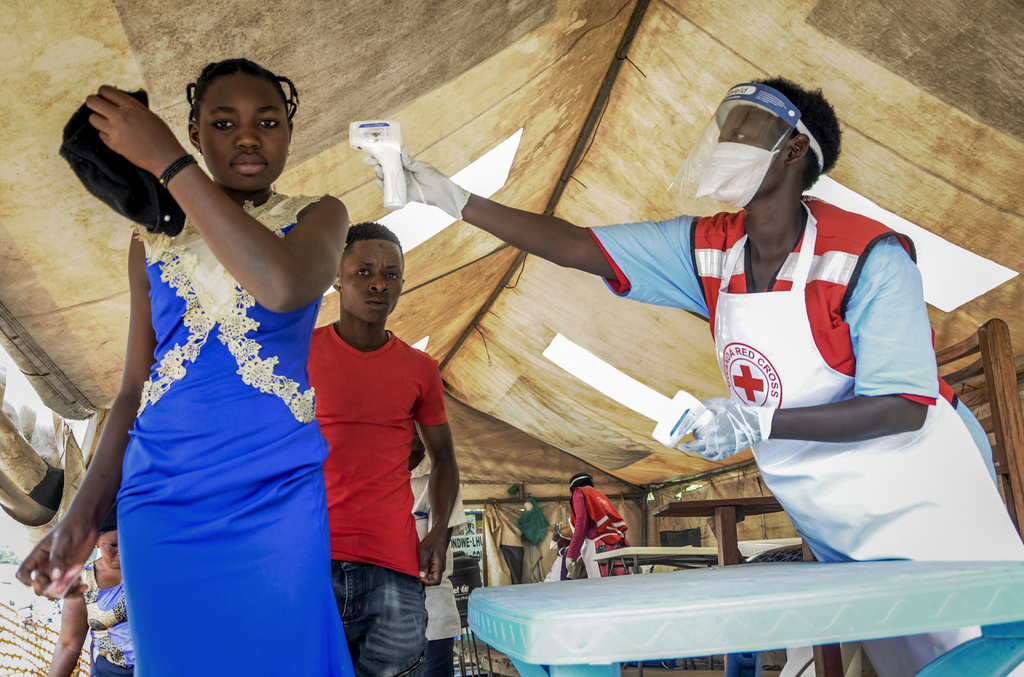[ad_1]
By RODNEY MUHUMUZA and AL-HADJI KUDRA MALIRO Associated Press
KAMPALA, Uganda (AP) — A 9-year-old Congolese girl who tested positive for Ebola in neighboring Uganda has died, Ugandan authorities said Friday, as the World Health Organization said that the outbreak has neared 3,000 cases.
The girl’s body was repatriated to Congo for a funeral upon the request of her father, according to Uganda’s health ministry.
The girl, who was traveling with her mother, was identified at a border screening Wednesday as a possible Ebola patient and isolated.

Although cases of cross-border contamination have been rare, this case highlights the risk of Ebola spreading across the border into neighboring Uganda and Rwanda. Borders in the region are often porous, and many people traveling at night use bush paths to cross over.
In June, a family of Congolese with some sick family members crossed into Uganda via a bush path. Two of them later died of Ebola, and the others were transferred back to Congo.
“It is critical we continue to be on high alert in high-risk areas and empower communities to be prepared in order to contain the virus,” the International Federation of Red Cross and Red Crescent Societies said.
Uganda has had multiple outbreaks of Ebola and hemorrhagic fevers since 2000.
Because the 9-year-old Ebola victim passed through an official entry point this week, Ugandan health authorities believe she had no contact with any Ugandan. But at least five other Congolese, including attendants to patients, who shared an ambulance with the sick girl have been identified by Ugandan officials as Ebola contacts. Four of them have since been taken back to Congo for vaccination and monitoring, said Joyce Moriku Kaducu, Ugandan minister of state in charge of primary health care.
Ebola has killed nearly 2,000 people in eastern Congo since August 2018. The disease is spread through contact with the bodily fluids of an infected person.
WHO said Friday that cases have reached 3,000 in Congo, with 1,893 confirmed deaths and about 900 survivors.
On average, 80 people per week are sickened by the virus, which has infected most people in Congo’s North Kivu province.
The Ebola outbreak in eastern Congo hasn’t shown signs of slowing down despite new treatments and vaccines given to more than 200,000 people in the region and the use of two therapeutic treatments being used as part of a clinical trial.
Insecurity has been one factor in a region where rebel groups have fought for control of mineral-rich lands for decades. Ebola also has spread because of mistrust by communities who have also staged attacks against health workers. Many people in eastern Congo don’t trust doctors and other medics.
“One year into the response, the lack of community acceptance remains the single greatest obstacle to containing the outbreak,” said Bob Kitchen, Vice President of Emergencies at the International Rescue Committee. “Building trust with the community doesn’t just mean dialogue with the affected population. It means working with the community to adapt the response and address the overall needs they are facing inside and outside of the Ebola outbreak.”
WHO Director-General Tedros Adhanom Ghebreyesus will travel this weekend to Congo with U.N. Secretary-General Antonio Guterres and senior officials, including Dr. Matshidiso Moeti, WHO regional director for Africa.
On Friday, he called on partners to increase their presence in the field.
“Our commitment to the people of the Democratic Republic of the Congo is that we will work alongside them to stop the Ebola outbreak,” Ghebreyesus said. “Our commitment also means strengthening the health systems to give them all the other things they need. Building strong systems is what will protect people, communities and the world.”
___
Maliro reported from Beni, Congo. AP writers Carley Petesch in Dakar, Senegal, and Jamey Keaten in Geneva contributed to this report.
[ad_2]
Source link
